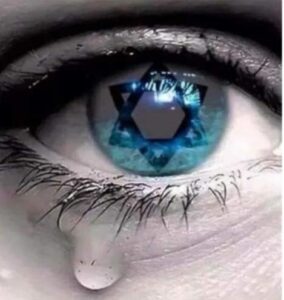
Art Therapy
“One of the basic rules of the universe is that nothing is perfect. Perfection simply doesn’t exist…..Without imperfection, neither you nor I would exist” ― Stephen Hawking



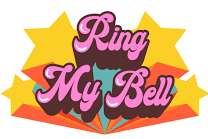 Call it Bell or call it Bezeq, it really does not matter. Those are national phone, internet and television services. The experience I am about to relate is truly what is referred to as “Catch 22”. The book by Joseph Heller was his first one, and was first published in 1961. It is cited as the most significant novel of the twentieth century. Although the subject is the adventures and misadventures of a US squadron in Italy during WWII, it became a phrase indicating the merry-go-round sometimes encountered in dealing with large corporations. Let me tell you of what transpired when I called customer service to try and arrange for automatic payment of our Bell bill, so that we would never again be in arrears of payment.
Call it Bell or call it Bezeq, it really does not matter. Those are national phone, internet and television services. The experience I am about to relate is truly what is referred to as “Catch 22”. The book by Joseph Heller was his first one, and was first published in 1961. It is cited as the most significant novel of the twentieth century. Although the subject is the adventures and misadventures of a US squadron in Italy during WWII, it became a phrase indicating the merry-go-round sometimes encountered in dealing with large corporations. Let me tell you of what transpired when I called customer service to try and arrange for automatic payment of our Bell bill, so that we would never again be in arrears of payment.
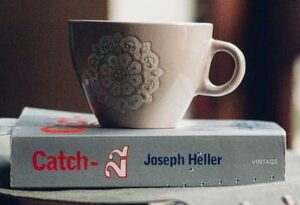 A very lovely young woman listened to my request, and proceeded to tell me that I could easily do that on the “My Bell” area of the website. I explained that I was calling her since our account was frozen and we could not access My Bell. I gave her our account number, and she checked it – “Oh,” she said, “I cannot deal with this; let me transfer you…”
A very lovely young woman listened to my request, and proceeded to tell me that I could easily do that on the “My Bell” area of the website. I explained that I was calling her since our account was frozen and we could not access My Bell. I gave her our account number, and she checked it – “Oh,” she said, “I cannot deal with this; let me transfer you…”
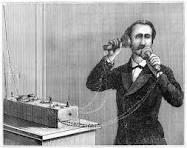 Lovely music played, and I waited 2, 3, 5, 7 minutes, … “Hello, my name is B. How can I help you?” I repeated the story, adding that we had paid the bills and our account should have been unfrozen, and that we wanted to set up automatic payment of our future bills. He checked our account, and indeed it was still locked. “I can help you with that” he said, and promptly opened our account. “Now,” he said, “you can go into My Bell, and arrange the automatic payment”. Patiently I explained that we are outside the country, and cannot receive a verifying text code. At that point he transferred us to the accounts department. The only problem was that just then the line cut out! I can no longer remember if we actually were able to solve the issue, but we will soon be back in Canada and hopefully we will be able to solve the problem there so that next time we will not have to jump through such hoops.
Lovely music played, and I waited 2, 3, 5, 7 minutes, … “Hello, my name is B. How can I help you?” I repeated the story, adding that we had paid the bills and our account should have been unfrozen, and that we wanted to set up automatic payment of our future bills. He checked our account, and indeed it was still locked. “I can help you with that” he said, and promptly opened our account. “Now,” he said, “you can go into My Bell, and arrange the automatic payment”. Patiently I explained that we are outside the country, and cannot receive a verifying text code. At that point he transferred us to the accounts department. The only problem was that just then the line cut out! I can no longer remember if we actually were able to solve the issue, but we will soon be back in Canada and hopefully we will be able to solve the problem there so that next time we will not have to jump through such hoops.
 Laughter and tears often follow each other, and there were plenty of tears during the last month. My closest and oldest friend departed forever after suffering great pain, and my only consolation is that she no longer suffers pain. I managed to see and talk with her several times, and even to say goodbye. Her family and ours were close in spite of the physical distance sometimes, and we are grateful for the friendship that was intellectual, and for the joy of celebrating holidays and family special occasions. Some of the memories are recorded on the videos her husband loved to create, and I am sure they will be a source of joy and some tears every time we view them.
Laughter and tears often follow each other, and there were plenty of tears during the last month. My closest and oldest friend departed forever after suffering great pain, and my only consolation is that she no longer suffers pain. I managed to see and talk with her several times, and even to say goodbye. Her family and ours were close in spite of the physical distance sometimes, and we are grateful for the friendship that was intellectual, and for the joy of celebrating holidays and family special occasions. Some of the memories are recorded on the videos her husband loved to create, and I am sure they will be a source of joy and some tears every time we view them.
Another old acquaintance passed away, and it was like a get together of all the old geezers, us included, who no longer see each other regularly. It seems like many of us meet each other only at the cemetery these days, and it is a time to reminisce. The sad part is that the young people we meet at the cemetery, which we had another opportunity to experience this month, are there to bury a young friend. The place was packed with members of our community and many young friends from the army, community, and college. When a young person dies—a son, a brother, a friend—the pain is devastating. We are losing too many of our young adults lately.
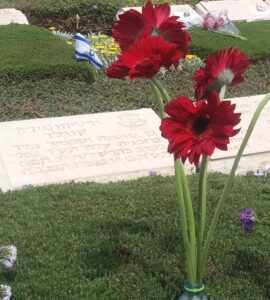 I said lately. But it turns out this has been the case since 1948, which was the bloodiest of Israel’s wars. It cost 6,373 killed in action (from pre-state days until 20 July 1949): almost 1% of the population, including quite a number of new immigrants and some foreign volunteers. My brother was one of them, and is buried in a military cemetery. Every year that I am in the country I visit his grave with all the other bereaved families on Memorial Day, which we observe the day before celebrating Independence Day. Every year the military cemetery gets larger, and the number of families crowding there is almost unbearable. Only the rows of the graves from 1948 have almost no visitors. Some never had any, since they were sole survivors of the holocaust; others no longer have family members who come, and lately I could not bear the false speeches. and the gun salutes, so I visit the day before Memorial Day when everything is peaceful.
I said lately. But it turns out this has been the case since 1948, which was the bloodiest of Israel’s wars. It cost 6,373 killed in action (from pre-state days until 20 July 1949): almost 1% of the population, including quite a number of new immigrants and some foreign volunteers. My brother was one of them, and is buried in a military cemetery. Every year that I am in the country I visit his grave with all the other bereaved families on Memorial Day, which we observe the day before celebrating Independence Day. Every year the military cemetery gets larger, and the number of families crowding there is almost unbearable. Only the rows of the graves from 1948 have almost no visitors. Some never had any, since they were sole survivors of the holocaust; others no longer have family members who come, and lately I could not bear the false speeches. and the gun salutes, so I visit the day before Memorial Day when everything is peaceful.
 The place is next to the sea, and a lovely breeze blows. Soldiers place bunches of “Forever” (Limonium) flowers on each grave, and youth from a nearby school place memorial candles for each of the unvisited graves. As we were there, they wanted to hear about my brother and the battle he fell in. It was moving and inspiring that after 77 years there are still young people who want to hear the stories. Story-telling nurtures our legacy and culture, and keeps the national history alive.
The place is next to the sea, and a lovely breeze blows. Soldiers place bunches of “Forever” (Limonium) flowers on each grave, and youth from a nearby school place memorial candles for each of the unvisited graves. As we were there, they wanted to hear about my brother and the battle he fell in. It was moving and inspiring that after 77 years there are still young people who want to hear the stories. Story-telling nurtures our legacy and culture, and keeps the national history alive.
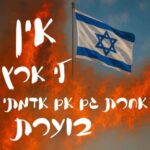 Remembrance and celebration are intermingled, and a tradition was established in my town of gathering after the municipal memorial service to have a singalong including choirs and individuals from the local music conservatory leading the community, singing old and new songs. My choir opened the evening with one of my favorite songs, whose title translates to “I have no other land”. Ein Li Eretz Acheret is a popular 1986 Israeli song with music by Corinne Allal and lyrics by Ehud Manor. The song was first performed by Gali Atari. The song was performed by Corinne Allal and Gali Atari last year just before Corinne passed away, and became an anthem for our time.
Remembrance and celebration are intermingled, and a tradition was established in my town of gathering after the municipal memorial service to have a singalong including choirs and individuals from the local music conservatory leading the community, singing old and new songs. My choir opened the evening with one of my favorite songs, whose title translates to “I have no other land”. Ein Li Eretz Acheret is a popular 1986 Israeli song with music by Corinne Allal and lyrics by Ehud Manor. The song was first performed by Gali Atari. The song was performed by Corinne Allal and Gali Atari last year just before Corinne passed away, and became an anthem for our time.
I have no other country
even if my land is aflame
Just a word in Hebrew
pierces my veins and my soul –
With a painful body, with a hungry heart,
Here is my home.
I will not stay silent
because my country changed her face
I will not give up reminding her
And sing in her ears
until she will open her eyes
I have no other country
even if my land is aflame
Just a word in Hebrew
pierces my veins and my soul –
With a painful body, with a hungry heart,
Here is my home.
I won’t be silent because my country
has changed her face.
I will not give up reminding her
And sing in her ears
until she will open her eyes
I have no other country
until she will renew her glorious days
Until she will open her eyes
Even though it was written so many years ago, it perfectly fits today’s atmosphere and sentiment. We still have hostages in Gaza, and the forests near Jerusalem are burning. The Houthis are firing rockets, and the war continues. The country is bleeding and people continue to demonstrate, but the government is deaf and pushes on with its own agenda. I am leaving soon to my other home, Canada, in spite of the fact that I have no other country, and I will not give up. I will return, hopefully to see that my country has changed its face, and opened its eyes.
